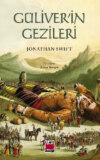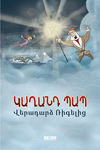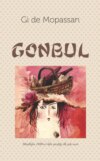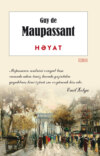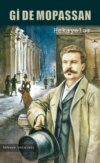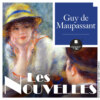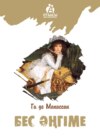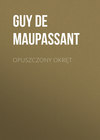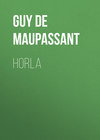Kitabı oku: «The Works of Guy de Maupassant, Volume 8», sayfa 14
A WIFE'S CONFESSION
My friend, you have asked me to relate to you the liveliest recollections of my life. I am very old, without relatives, without children; so I am free to make a confession to you. Promise me one thing – never to reveal my name.
I have been much loved, as you know; I have often myself loved. I was very beautiful; I may say this to-day, when my beauty is gone. Love was for me the life of the soul, just as the air is the life of the body. I would have preferred to die rather than exist without affection, without having somebody always to care for me. Women often pretend to love only once with all the strength of their hearts; it has often happened to be so violent in one of my attachments that I thought it would be impossible for my transports ever to end. However, they always died out in a natural fashion, like a fire when it has no more fuel.
I will tell you to-day the first of my adventures, in which I was very innocent, but which led to the others. The horrible vengeance of that dreadful chemist of Pecq recalls to me the shocking drama of which I was, in spite of myself, a spectator.
I had been a year married to a rich man, Comte Herve de Ker – a Breton of ancient family, whom I did not love, you understand. True love needs, I believe at any rate, freedom and impediments at the same time. The love which is imposed, sanctioned by law, and blessed by the priest – can we really call that love? A legal kiss is never as good as a stolen kiss. My husband was tall in stature, elegant, and a really fine gentleman in his manners. But he lacked intelligence. He spoke in a downright fashion, and uttered opinions that cut like the blade of a knife. He created the impression that his mind was full of ready-made views instilled into him by his father and mother, who had themselves got them from their ancestors. He never hesitated, but on every subject immediately made narrow-minded suggestions, without showing any embarrassment and without realizing that there might be other ways of looking at things. One felt that his head was closed up, that no ideas circulated in it, none of those ideas which renew a man's mind and make it sound, like a breath of fresh air passing through an open window into a house.
The chateau in which we lived was situated in the midst of a desolate tract of country. It was a large, melancholy structure, surrounded by enormous trees, with tufts of moss on it resembling old men's white beards. The park, a real forest, was enclosed in a deep trench called the ha-ha; and at its extremity, near the moorland, we had big ponds full of reeds and floating grass. Between the two, at the edge of a stream which connected them, my husband had got a little hut built for shooting wild ducks.
We had, in addition to our ordinary servants, a keeper, a sort of brute devoted to my husband to the death, and a chambermaid, almost a friend, passionately attached to me. I had brought her back from Spain with me five years before. She was a deserted child. She might have been taken for a gipsy with her dusky skin, her dark eyes, her hair thick as a wood and always clustering around her forehead. She was at the time sixteen years old, but she looked twenty.
The autumn was beginning. We hunted much, sometimes on neighboring estates, sometimes on our own; and I noticed a young man, the Baron de C – , whose visits at the chateau became singularly frequent. Then he ceased to come; I thought no more about it; but I perceived that my husband changed in his demeanor towards me.
He seemed taciturn and preoccupied; he did not kiss me; and, in spite of the fact that he did not come into my room, as I insisted on separate apartments in order to live a little alone, I often at night heard a furtive step drawing near my door, and withdrawing a few minutes after.
As my window was on the ground-floor I thought I had also often heard someone prowling in the shadow around the chateau. I told my husband about it, and, having looked at me intently for some seconds, he answered:
"It is nothing – it is the keeper."
Now, one evening, just after dinner, Herve, who appeared to be extraordinarily gay, with a sly sort of gaiety, said to me:
"Would you like to spend three hours out with the guns, in order to shoot a fox who comes every evening to eat my hens?"
I was surprised. I hesitated; but, as he kept staring at me with singular persistency, I ended by replying:
"Why, certainly, my friend." I must tell you that I hunted like a man the wolf and the wild boar. So it was quite natural that he should suggest this shooting expedition to me.
But my husband, all of a sudden, had a curiously nervous look; and all the evening he seemed agitated, rising up and sitting down feverishly.
About ten o'clock, he suddenly said to me:
"Are you ready?"
I rose; and, as he was bringing me my gun himself, I asked:
"Are we to load with bullets or with deershot?"
He showed some astonishment; then he rejoined:
"Oh! only with deershot; make your mind easy! that will be enough."
Then, after some seconds, he added in a peculiar tone:
"You may boast of having splendid coolness."
I burst out laughing.
"I? Why, pray? Coolness because I went to kill a fox? But what are you thinking of, my friend?"
And we quietly made our way across the park. All the household slept. The full moon seemed to give a yellow tint to the old gloomy building, whose slate roof glittered brightly. The two turrets that flanked it had two plates of light on their summits, and no noise disturbed the silence of this clear, sad night, sweet and still, which seemed in a death-trance. Not a breath of air, not a shriek from a toad, not a hoot from an owl; a melancholy numbness lay heavy on everything. When we were under the trees in the park, a sense of freshness stole over me, together with the odor of fallen leaves. My husband said nothing; but he was listening, he was watching, he seemed to be smelling about in the shadows, possessed from head to foot by the passion for the chase.
We soon reached the edges of the ponds.
Their tufts of rushes remained motionless; not a breath of air caressed it; but movements which were scarcely perceptible ran through the water. Sometimes the surface was stirred by something, and light circles gathered around, like luminous wrinkles enlarging indefinitely.
When we reached the hut where we were to lie in wait, my husband made me go in first; then he slowly loaded his gun, and the dry cracking of the powder produced a strange effect on me. He saw that I was shuddering, and asked:
"Does this trial happen to be quite enough for you? If so, go back."
I was much surprised, and I replied:
"Not at all. I did not come to go back without doing anything. You seem queer this evening."
He murmured, "As you wish," and we remained there without moving.
At the end of about half-an-hour, as nothing broke the oppressive stillness of this bright autumn night, I said, in a low tone:
"Are you quite sure he is passing this way?"
Herve winced as if I had bitten him, and with his mouth close to my ear, he said:
"Make no mistake about it. I am quite sure."
And once more there was silence.
I believe I was beginning to get drowsy when my husband pressed my arm, and his voice, changed to a hiss, said:
"Do you see him over there under the trees?"
I looked in vain; I could distinguish nothing. And slowly Herve now cocked his gun, all the time fixing his eyes on my face.
I was myself making ready to fire, and suddenly, thirty paces in front of us, appeared in the full light of the moon a man who was hurrying forward with rapid movements, his body bent, as if he were trying to escape.
I was so stupefied that I uttered a loud cry; but, before I could turn round, there was a flash before my eyes; I heard a deafening report, and I saw the man rolling on the ground, like a wolf hit by a bullet.
I burst into dreadful shrieks, terrified, almost going mad; then a furious hand – it was Herve's – seized me by the throat. I was flung down on the ground, then carried off by his strong arms. He ran, holding me up, till we reached the body lying on the grass, and he threw me on top of it violently, as if he wanted to break my head.
I thought I was lost; he was going to kill me; and he had just raised his heel up to my forehead when, in his turn, he was gripped, knocked down before I could yet realize what had happened.
I rose up abruptly, and I saw kneeling on top of him Porquita, my maid, clinging like a wild cat to him with desperate energy, tearing off his beard, his moustache, and the skin of his face.
Then, as if another idea had suddenly taken hold of her mind, she rose up, and, flinging herself on the corpse, she threw her arms around the dead man, kissing his eyes and his mouth, opening the dead lips with her own lips, trying to find in them a breath and a long, long kiss of lovers.
My husband, picking himself up, gazed at me. He understood, and falling at my feet, said:
"Oh! forgive me, my darling, I suspected you, and I killed this girl's lover. It was my keeper that deceived me."
But I was watching the strange kisses of that dead man and that living woman, and her sobs and her writhings of sorrowing love —
And at that moment I understood that I might be unfaithful to my husband.
RELICS OF THE PAST
My dear Colette, – I do not know whether you remember a verse of M. Sainte-Beuve which we have read together, and which has remained fixed in my memory; for me this verse speaks eloquently; and it has very often reassured my poor heart, especially for some time past. Here it is:
"To be born, to live, and die in the same house."
I am now all alone in this house where I was born, where I have lived, and where I hope to die. It is not gay every day, but it is pleasant; for there I have souvenirs all around me.
My son Henri is a barrister; he comes to see me twice a year. Jeanne is living with her husband at the other end of France, and it is I who go to see her each autumn. So here I am, all, all alone, but surrounded by familiar objects which incessantly speak to me about my own people, the dead, and the living separated from me by distance.
I no longer read much; I am too old for that; but I am constantly thinking, or rather dreaming. I do not dream as I used to do long ago. You may recall to mind any wild fancies, the adventures our brains concocted when we were twenty, and all the horizons of happiness that dawned upon us!
Nothing out of all our dreaming has been realized, or rather it is quite a different thing that has happened, less charming, less poetic, but sufficient for those who know how to accept their lot in this world bravely.
Do you know why we women are so often unhappy? It is because we are taught in our youth to believe too much in happiness! We are never brought up with the idea of fighting, of striving, of suffering. And, at the first shock, our hearts are broken; we look forward, with blind faith, to cascades of fortunate events. What does happen is at best but a partial happiness, and thereupon we burst out sobbing. Happiness, the real happiness that we dream of, I have come to know what that is. It does not consist in the arrival of great bliss, for any great bliss that falls to our share is to be found in the infinite expectation of a succession of joys to which we never attain. Happiness is happy expectation; it is the horizon of hope; it is, therefore, endless illusion; and, old as I am, I create illusions for myself still, in fact, every day I live; only their object is changed, my desires being no longer the same. I have told you that I spend my brightest hours in dreaming. What else should I do?
I have two ways of doing this. I am going to tell you what they are; they may perhaps prove useful to you.
Oh! the first is very simple; it consists in sitting down before my fire in a low armchair made soft for my old bones, and looking back at the things that have been put aside.
One life is so short, especially a life entirely spent in the same spot:
"To be born, to live, and die in the same house."
The things that bring back the past to our recollection are heaped, pressed together; and, we are old, it sometimes seems no more than ten days since we were young. Yes; everything slips away from us, as if life itself were but a single day: morning, evening, and then comes night – a night without a dawn!
When I gaze into the fire, for hours and hours, the past rises up before me as though it were but yesterday. I no longer think of my present existence; reverie carries me away; once more I pass through all the changes of my life.
And I often am possessed by the illusion that I am a young girl, so many breaths of bygone days are wafted back to me, so many youthful sensations and even impulses, so many throbbings of my young heart – all the passionate ardor of eighteen; and I have clear, as fresh realities, visions of forgotten things. Oh! how vividly, above all, do the memories of my walks as a young girl come back to me! There, in the armchair of mine, before the fire, I saw once more, a few nights since, a sunset on Mont Saint-Michel, and immediately afterwards I was riding on horseback through the forest of Uville with the odors of the damp sand and of the flowers steeped in dew, and the evening star sending its burning reflection through the water and bathing my face in its rays as I galloped through the copse. And all I thought of then, my poetic enthusiasm at the sight of the boundless sea, my keen delight at the rustling of the branches as I passed, my most trivial impressions, every fragment of thought, desire, or feeling, all, all came back to me as if I were there still, as if fifty years had not glided by since then, to chill my blood and moderate my hopes. But my other way of reviving the long ago is much better.
You know, or you do not know, my dear Colette, that we destroy nothing in the house. We have upstairs, under the roof, a large room for cast-off things which we call "the lumber-room." Everything which is no longer used is thrown there. I often go up there, and gaze around me. Then I find once more a heap of nothings that I had ceased to think about, and that recalled a heap of things to my mind. They are not those beloved articles of furniture which we have known since our childhood and to which are attached recollections of events of joys or sorrows, dates in our history, which, from the fact of being intermingled with our lives, have assumed a kind of personality, a physiognomy, which are the companions of our pleasant or gloomy house, the only companions, alas! that we are sure not to lose, the only ones that will not die, like the others – those whose features, whose loving eyes, whose lips, whose voices, have vanished for ever. But I find instead among the medley of worn-out gewgaws those little old insignificant objects which have hung on by our side for forty years without ever having been noticed by us, and which, when we suddenly lay eyes on them again, have somehow the importance, the significance of relics of the past. They produce on my mind the effect of those people – whom we have known for a very long time without ever having seen them as they really are, and who, all of a sudden, some evening, quite unexpectedly, break out into a stream of interminable talk, and tell us all about themselves down to their most hidden secrets, of which we had never even suspected the existence.
And I move about from one object to the other with a little thrill in my heart every time something fixes my attention. I say to myself: "See there! I broke that the night Paul started for Lyons;" or else, "Ah! there is mamma's little lantern, which she used to carry with her going to her evening devotions on dark winter nights." There are even things in this room which have no story to tell me, which have come down from my grandparents, things therefore, whose history and adventures are utterly unknown to those who are living to-day, and whose very owners nobody knows now. Nobody has seen the hands that used to touch them or the eyes that used to gaze at them. These are the things that make me have long, long dreams. They represent to my mind desolate people whose last remaining friend is dead. You, my dear Colette, can scarcely comprehend all this, and you will smile at my simplicity, my childish, sentimental whims. You are a Parisian, and you Parisians do not understand this interior life, those eternal echoes of one's own heart. You live in the outer world, with all your thoughts in the open. Living alone as I do, I can only speak about myself. When you are answering this letter, tell me a little about yourself, that I may also be able to put myself in your place, as you will be able to put yourself in mine to-morrow.
But you will never completely understand M. de Sainte Beuve's verse:
"To be born, to live, and to die in one house."
A thousand kisses, my old friend,Adelaide.
THE PEDDLER
How many trifling occurrences, things which have left only a passing impression on our minds, humble dramas of which we have got a mere glimpse so that we have to guess at or suspect their real nature, are, while we are still young and inexperienced, threads, so to speak, guiding us, step by step, towards a knowledge of the painful truth!
Every moment, when I am retracing my steps during the long wandering reveries which distract my thoughts along the path through which I saunter at random, my soul takes wing, and suddenly I recall little incidents of a gay or sinister character which, emerging from the shades of the past, flit before my memory as the birds flit through the bushes before my eyes.
This summer, I wandered along a road in Savoy which commands a view of the right bank of the Lake of Bourget, and, while my glance floated over that mass of water, mirror-like and blue, with a unique blue, pale, tinted with glittering beams by the setting sun, I felt my heart stirred by that attachment which I have had since my childhood for the surface of lakes, for rivers, and for the sea. On the opposite bank of the vast liquid plate, so wide that you did not see the ends of it, one vanishing in the Rhone, and the other in the Bourget, rose the high mountain, jagged like a crest up to the topmast peak of the "Cats's Tooth." On either side of the road, vines, trailing from tree to tree, choked under their leaves their slender supporting branches, and they extended in garlands through the fields, green, yellow, and red garlands, festooning from one trunk to the other, and spotted with clusters of dark grapes.
The road was deserted, white, and dusty. All of a sudden, a man emerged out of the thicket of large trees which shuts in the village of Saint-Innocent, and, bending under a load, he came towards me, leaning on a stick.
When he had come closer to me, I discovered that he was a peddler, one of those itinerant dealers who go about the country from door to door, selling paltry objects cheaply, and thereupon a reminiscence of long ago arose up in my mind, a mere nothing almost, the recollection simply of an accidental meeting I had one night between Argenteuil and Paris when I was twenty-one.
All the happiness of my life, at this period, was derived from boating. I had taken a room in an obscure inn at Argenteuil, and, every evening, I took the Government clerks' train, that long slow train which, in its course, sets down at different stations a crowd of men with little parcels, fat and heavy, for they scarcely walk at all, so that their trousers are always baggy owing to their constant occupation of the office-stool. This train, in which it seemed to me I could even sniff the odor of the writing-desk, of official documents and boxes, deposited me at Argenteuil. My boat was waiting for me, ready to glide over the water. And I rapidly plied my oar so that I might get out and dine at Bezons or Chatou or Epinay or Saint-Ouen. Then I came back, put up my boat, and made my way back on foot to Paris with the moon shining down on me.
Well, one night on the white road I perceived just in front of me a man walking. Oh! I was constantly meeting those night travelers of the Parisian suburbs so much dreaded by belated citizens. This man went on slowly before me with a heavy load on his shoulders.
I came right up to him by quickening my pace so much that my footsteps rang on the road. He stopped and turned round; then, as I kept approaching nearer and nearer, he crossed to the opposite side of the road.
As I rapidly passed him, he called out to me:
"Hallo! good evening, monsieur."
I responded:
"Good evening, mate."
He went on:
"Are you going far?"
"I am going to Paris."
"You won't be long getting there; you're going at a good pace. As for me, I have too big a load on my shoulders to walk so quickly."
I slackened my pace. Why had this man spoken to me? What was he carrying in this big pack? Vague suspicions of crime sprang up in my mind, and rendered me curious. The columns of the newspapers every morning contain so many accounts of crimes committed in this place, the peninsula of Gennevilliers, that some of them must be true. Such things are not invented merely to amuse readers – all this catalogue of arrests and varied misdeeds with which the reports of the law courts are filled.
However, this man's voice seemed rather timid than bold, and up to the present his manner had been more discreet than aggressive.
In my turn I began to question him:
"And you – are you going far?"
"Not farther than Asnieres."
"Is Asnieres your place of abode?"
"Yes, monsieur, I am a peddler by occupation, and I live at Asnieres."
He had quitted the sidewalk, where pedestrians move along in the daytime under the shadows of the trees, and he was soon in the middle of the road. I followed his example. We kept staring at each other suspiciously, each of us holding his stick in his hand. When I was sufficiently close to him, I felt less distrustful. He evidently was disposed to assume the same attitude towards me, for he asked:
"Would you mind going a little more slowly?"
"Why do you say this?"
"Because I don't care for this road by night. I have goods on my back, and two are always better than one. When two men are together, people don't attack them."
I felt that he was speaking truly, and that he was afraid. So I yielded to his wishes, and the pair of us walked on, side by side, this stranger and I, at one o'clock in the morning, along the road leading from Argenteuil to Asnieres.
"Why are you going home so late when it is so dangerous?" I asked my companion.
He told me his history. He had not intended to return home this evening, as he had brought with him that very morning a stock of goods to last him three or four days. But he had been so fortunate in disposing of them that he found it necessary to get back to his abode without delay in order to deliver next day a number of things which had been bought on credit.
He explained to me with genuine satisfaction that he had managed the business very well, having a tendency to talk confidentially, and that the knick-knacks he displayed were useful to him in getting rid, while gossiping, of other things which he could not easily sell.
He added:
"I have a shop in Asnieres. 'Tis my wife keeps it."
"Ah! So you're married?"
"Yes, m'sieur, for the last fifteen months. I have got a very nice wife. She'll get a surprise when she sees me coming home to-night."
He then gave me an account of his marriage. He had been after this young girl for two years, but she had taken time to make up her mind.
She had, since her childhood, kept a little shop at the corner of a street, where she sold all sorts of things – ribbons, flowers in summer, and principally pretty little shoe-buckles, and many other gewgaws, in which, owing to the favor of a manufacturer, she enjoyed a speciality. She was well-known in Asnieres as "La Bluette." This name was given to her because she often dressed in blue. And she made money, as she was very skillful in everything she did. His impression was that she was not very well at the present moment; he believed she was in the family way, but he was not quite sure. Their business was prospering; and he traveled about exhibiting samples to all the small traders in the adjoining districts. He had become a sort of traveling commission-agent for some of the manufacturers, working at the same time for them and for himself.
"And you – what are you," he said.
I answered him with an air of embarrassment. I explained that I had a sailing-boat and two yawls in Argenteuil, that I came for a row every evening, and that, as I was fond of exercise, I sometimes walked back to Paris, where I had a profession, which – I led him to infer – was a lucrative one.
He remarked:
"Faith, if I had spondulics like you, I wouldn't amuse myself by trudging that way along the roads at night – 'Tisn't safe along here."
He gave me a sidelong glance, and I asked myself whether he might not all the same, be a criminal of the sneaking type who did not want to run any fruitless risk.
Then he restored my confidence when he murmured:
"A little less quickly, if you please. This pack of mine is heavy."
The sight of a group of houses showed that we had reached Asnieres.
"I am nearly at home," he said. "We don't sleep in the shop; it is watched at night by a dog, but a dog who is worth four men. And then it costs too much to live in the center of the town. But listen to me, monsieur! You have rendered me a precious service, for I don't feel my mind at ease when I'm traveling with my pack along the roads. Well, now you must come in with me, and drink a glass of mulled wine with my wife if she hasn't gone to bed, for she is a sound sleeper, and doesn't like to be waked up. Besides, I'm not a bit afraid without my pack, and so I'll see you to the gates of the city with a cudgel in my hand."
I declined the invitation; he insisted on my coming in; I still held back; he pressed me with so much eagerness, with such an air of real disappointment, such expressions of deep regret – for he had the art of expressing himself very forcibly – asking me in the tone of one who felt wounded "whether I objected to have a drink with a man like him," that I finally gave way and followed him up a lonely road towards one of those big dilapidated houses which are to be found on the outskirts of suburbs.
In front of this dwelling I hesitated. This high barrack of plaster looked like a den for vagabonds, a hiding-place for suburban brigands. But he pushed forward a door which had not been locked, and made me go in before him. He led me forward by the shoulders, through profound darkness, towards a staircase where I had to feel my way with my hands and feet, with a well-grounded apprehension of tumbling into some gaping cellar.
When I had reached the first landing, he said to me: "Go on up! 'Tis the sixth story."
I searched my pockets, and, finding there a box of vestas, I lighted the way up the ascent. He followed me, puffing under his pack, repeating:
"Tis high! 'tis high!"
When we were at the top of the house, he drew forth from one of his inside pockets a key attached to a thread, and unlocking his door he made me enter.
It was a little whitewashed room, with a table in the center, six chairs, and a kitchen-cupboard close to the wall.
"I am going to wake up my wife," he said; "then I am going down to the cellar to fetch some wine; it doesn't keep here."
He approached one of the two doors which opened out of this apartment, and exclaimed:
"Bluette! Bluette!" Bluette did not reply. He called out in a louder tone: "Bluette! Bluette!"
Then knocking at the partition with his fist, he growled: "Will you wake up in God's name?"
He waited, glued his ear to the key-hole, and muttered, in a calmer tone: "Pooh! if she is asleep, she must be let sleep! I'll go and get the wine: wait a couple of minutes for me."
He disappeared. I sat down and made the best of it.
What had I come to this place for? All of a sudden, I gave a start, for I heard people talking in low tones, and moving about quietly, almost noiselessly, in the room where the wife slept.
Deuce take it! Had I fallen into some cursed trap? Why had this woman – this Bluette – not been awakened by the loud knocking of her husband at the doorway leading into her room; could it have been merely a signal conveying to accomplices: "There's a mouse in the trap! I'm going to look out to prevent him escaping. 'Tis for you to do the rest!"
Certainly, there was more stir than before now in the inner room; I heard the door opening from within. My heart throbbed. I retreated towards the further end of the apartment, saying to myself: "I must make a fight of it!" and, catching hold of the back of a chair with both hands, I prepared for a desperate struggle.
The door was half opened, a hand appeared which kept it ajar; then a head, a man's head covered with a billycock hat, slipped through the folding-doors, and I saw two eyes staring hard at me. Then so quickly that I had not time to make a single movement by way of defense, the individual, the supposed criminal, a tall young fellow in his bare feet with his shoes in his hands, a good looking chap, I must admit – half a gentleman, in fact, made a dash for the outer door, and rushed down the stairs.
I resumed my seat. The adventure was assuming a humorous aspect. And I waited for the husband, who took a long time fetching the wine. At last I heard him coming up the stairs, and the sound of his footsteps made me laugh, with one of those solitary laughs which it is hard to restrain.
He entered with two bottles in his hands. Then he asked me:
"Is my wife still asleep? You didn't hear her stirring – did you?"
I knew instinctively that there was an ear pasted against the other side of the partition-door, and I said: "No, not at all."
And now he again called out:
"Pauline!"
She made no reply, and did not even move.
He came back to me, and explained:
"You see, she doesn't like me to come home at night, and take a drop with a friend."

